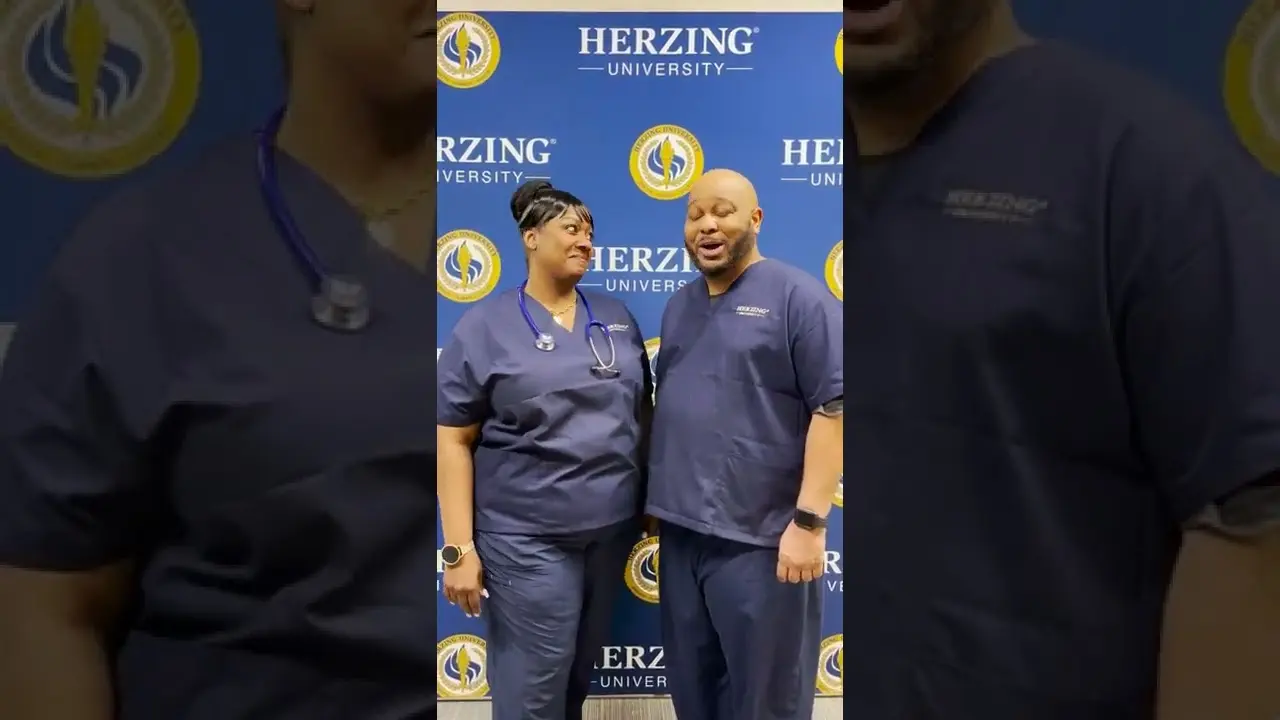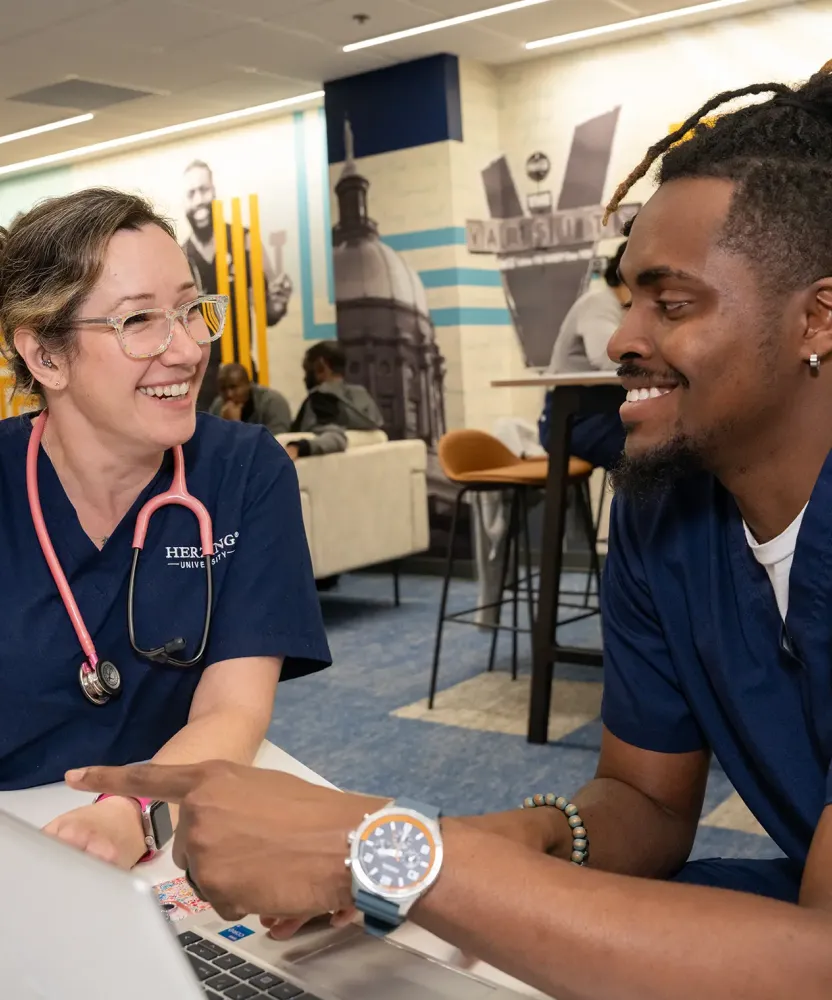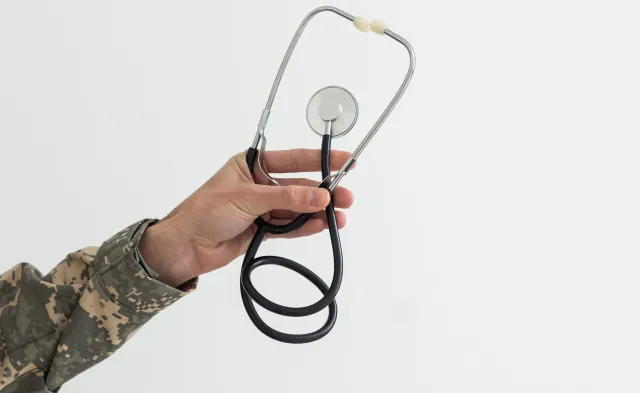Earn your BSN in Atlanta and become possible
| Accreditation | CCNE accredited,1 Accredited by the Higher Learning Commission |
|---|---|
| Transfer credit | Up to 90 approved credits |
| Format | Take classes on campus in Atlanta, Georgia + online general education courses |
| QuickPaths | Earn dual credit towards a Master of Science in Nursing (MSN); transfer credit, stackable credentials, and adaptive learning technology build a faster pathway to a higher education with Herzing University |
Learn More Today!
Bachelor of Science in Nursing (BSN) - Atlanta
The Bachelor of Science in Nursing degree is a 120-credit undergraduate pre-licensure program which prepares you for a career as a Registered Nurse (RN). The Atlanta campus degree program provides students with fundamental knowledge and skills in family nursing, medical-surgical nursing, nursing informatics, health assessment, and much more.
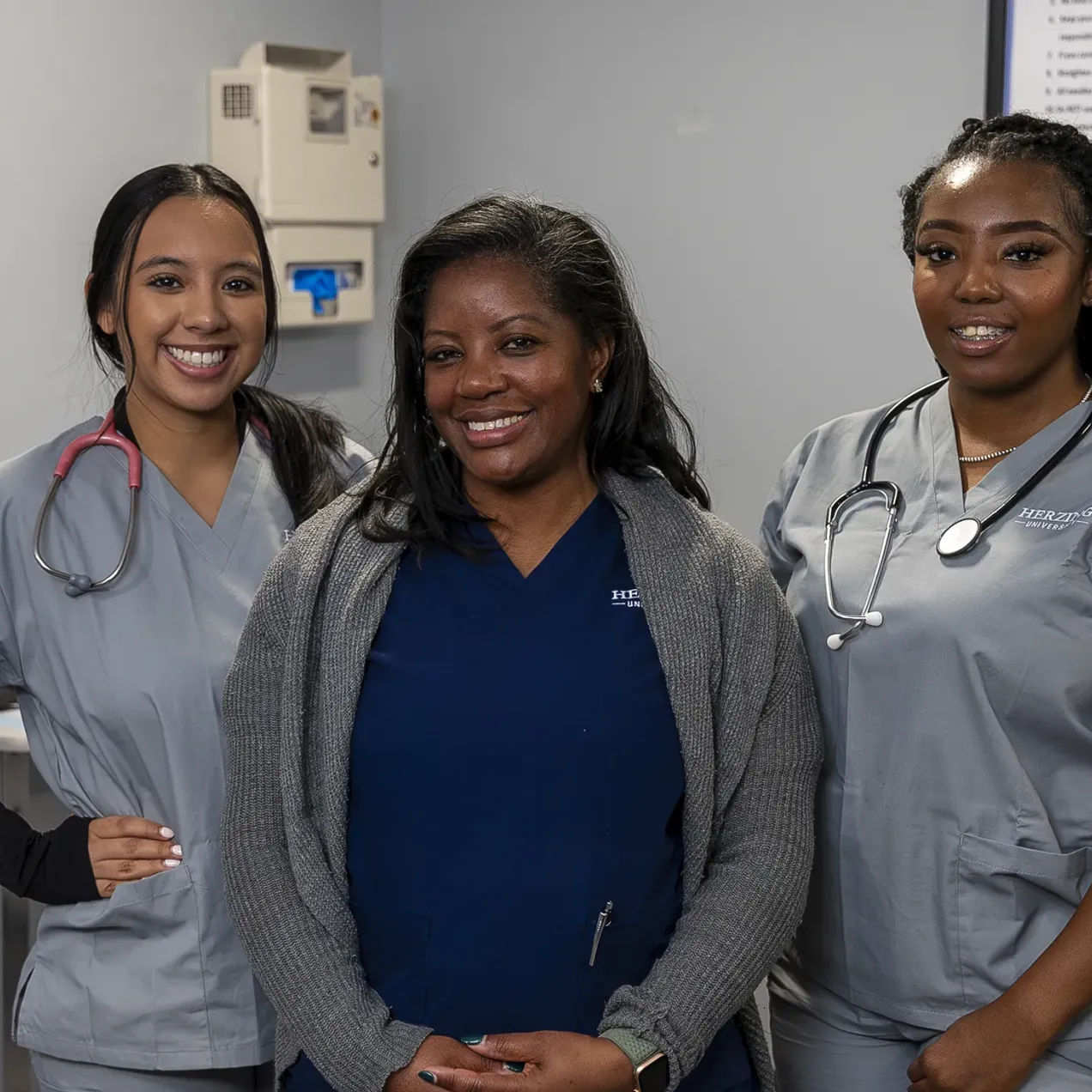
Career-focused curriculum
Discover the crucial knowledge and skills required to succeed in your work and build a foundation for continued career growth.
Flexible schedule
We work hard to help you maintain school-life balance, striving to be as flexible as possible for busy non-traditional students.
Virtual services
Access to extensive virtual services, including academic advising, tutoring, support services, technical support and library services.
Lifelong support
We support your ongoing career advancement by providing comprehensive, personalized student services with lifelong career coaching.
Rolling admissions
No application deadlines to worry about. Apply when you’re ready and prepare to get started soon.
Courses & Curriculum Details
The Herzing University Atlanta BSN program prepares the generalist nurse with foundational knowledge with a focus on holistic, safe and evidence-based patient care. As a registered nurse your success comes with your ability to think critically and make well-informed judgments based on a diverse array of patients across the lifespan. Our goal in general education and core nursing classes is to build you into a competent nursing professional well-equipped to handle many different healthcare settings and circumstances.
- Enroll smoothly. No jumping through hoops. Transfer prior credits and get enrolled without a long wait.
- Engage with faculty. A 14:1 student-faculty ratio means you’ll have access to faculty both in and out of class.
Upon completion, students will be qualified and prepared to sit for the NCLEX-RN and become a registered nurse in Georgia.
| Program | Months i | Credit |
|---|---|---|
| Bachelor of Science in Nursing (BSN) | 36 | 120 |
Average number of months for students to complete program
Required Courses in Nursing
All courses, 66.00 semester credit hours, are required.
Dual Credit Option for Taking Graduate Level Courses
Dual Credit Options are not available for New Orleans students. See Academic Information for full requirements under title Earning Graduate Credits as an Undergraduate Student. Undergraduate Course Graduate Course Equivalency NSG 321 Advanced Leadership and Management NU 730 Systems-Based Practice (Transferrable to MSN & DNP Programs) NSG 324 Evidence Based Practice in Nursing NU 602 Epidemiology, Research, and Theory (Transferrable to BSN to DNP Program Only) NSG 421 Nursing Informatics NU 725 Technology and Nursing Informatics in Advanced Practice (Transferrable to MSN & DNP Programs) NSG 423 Policy, Trends, & Ethics in Nursing HA 610 Health Policy and Management (Transferrable to MSN Program, except for MSNWHNP)
Required Courses in General Education
Students enrolled in the BSN program must complete a minimum of 52.00 semester credit hours in general education distributed among the following disciplines. A minimum of 9.00 semester credit hours must be upper level (300- to 400-level courses). The Herzing University General Education offerings are listed below. Refer to the General Education section of the catalog for additional information on general education requirement. 12.00 Semester Credit Hours in Communications EN 104 English Composition I EN 111 Information Literacy EN 116 Speech EN 304 English Composition II 16.00 Semester Credit Hours in Science SC 154 Anatomy and Physiology I for Nurses SC 254 Anatomy and Physiology II for Nurses SC 150 Principles of Nutrition SC 166 Microbiology SC 186 Chemistry 9.00 Semester Credit Hours in Humanities HU 140 Cultural Diversity HU 240 Introduction to Humanities HU 340 Humanities and Contemporary Popular Culture 6.00 Semester Credit Hours in Mathematics MA 109 College Algebra MA 320 Statistics 9.00 Semester Credit Hours in Social or Behavioral Science PS 101 Psychology PS 105 Developmental Psychology SS 350 Social Issues and Technology Note: Transfer students may transfer courses that are within 1.00 semester credit hour of the courses listed above to meet these discipline requirements. Any resulting deficiency in the total of 52.00 semester credit hours required in general education may be made up with general education electives from any of the listed disciplines. Science courses being transferred in from other institutions must meet the nursing program science requirements.
Special General Education Grading Requirements for Nursing Support Courses
The following science courses must be completed with a grade of "B" (80%) or better. Only two attempts are permitted for each course and a student who fails to successfully complete in the maximum attempts is subject to dismissal from the nursing program. SC 154 Anatomy and Physiology I for Nurses Semester Credit Hours: 4.00 SC 254 Anatomy and Physiology II for Nurses Semester Credit Hours: 4.00 The following general education courses must be completed with a grade of "C" (70%) or better for a student to continue in the nursing program. *BSN students enrolled in the Atlanta Campus require a "B" (80%) or better in SC 166 Microbiology and SC 186 Chemistry. PS 105 Developmental Psychology Semester Credit Hours: 3.00 SC 150 Principles of Nutrition Semester Credit Hours: 2.00 SC 166 Microbiology Semester Credit Hours: 3.00 SC 186 Chemistry Semester Credit Hours: 3.00 MA 109 College Algebra Semester Credit Hours: 3.00 MA 320 Statistics Semester Credit Hours: 3.00 A student who is dropped from the nursing program for failing to achieve the minimum grade specified in the courses listed above, but who otherwise meets the academic standards of the University may transfer to another Herzing degree program and/or may appeal to reapply to the BSN nursing program in a future semester.
Personal and Professional Development Courses
All courses, 2.00 semester credit hours, are required.
Resuming students should refer to the section on re-entering for additional requirements.
Distribution of Contact Hours by Course
Distribution of Contact Hours by Course Course or Category Lecture Lab Clinical Total Contact Hours Credits NSG 120 45.00 0.00 0.00 45.00 3.00 NSG 121 30.00 30.00 0.00 60.00 3.00 NSG 122 45.00 30.00 45.00 120.00 5.00 NSG 123 45.00 0.00 135.00 180.00 6.00 NSG 124 45.00 0.00 0.00 45.00 3.00 NSG 221 45.00 0.00 45.00 90.00 4.00 NSG 222 60.00 0.00 90.00 150.00 6.00 NSG 223 60.00 0.00 90.00 150.00 6.00 NSG 321 45.00 0.00 0.00 45.00 3.00 NSG 323 60.00 0.00 45.00 105.00 5.00 NSG 324 45.00 0.00 0.00 45.00 3.00 NSG 421 45.00 0.00 0.00 45.00 3.00 NSG 233 45.00 30.00 45.00 120.00 5.00 NSG 423 45.00 0.00 0.00 45.00 3.00 NSG 425 30.00 0.00 135.00 165.00 5.00 NSG 426 45.00 0.00 0.00 45.00 3.00 EN 101 45.00 0.00 0.00 45.00 3.00 EN 111 45.00 0.00 0.00 45.00 3.00 EN 116 45.00 0.00 0.00 45.00 3.00 EN 304 45.00 0.00 0.00 45.00 3.00 SC 150 30.00 0.00 0.00 30.00 2.00 SC 166 30.00 30.00 0.00 60.00 3.00 SC 186 30.00 30.00 0.00 60.00 3.00 SC 154 45.00 30.00 0.00 75.00 4.00 SC 254 45.00 30.00 0.00 75.00 4.00 MA 109 45.00 0.00 0.00 45.00 3.00 MA 320 45.00 0.00 0.00 45.00 3.00 HU 140 45.00 0.00 0.00 45.00 3.00 HU 240 45.00 0.00 0.00 45.00 3.00 HU 340 45.00 0.00 0.00 45.00 3.00 PS 101 45.00 0.00 0.00 45.00 3.00 PS 105 45.00 0.00 0.00 45.00 3.00 SS 350 45.00 0.00 0.00 45.00 3.00 PD 121 15.00 0.00 0.00 15.00 1.00 PD 202 15.00 0.00 0.00 15.00 1.00 Totals 1485.00 210.00 630.00 2325.00 120.00
Enrollment requirements
To be considered for admission into the BSN program in Atlanta, prerequisites include:
- Hold a high school diploma or equivalent (Diploma, HSED or GED)
- Minimum cumulative GPA of 2.80i
- Meet a minimum composite score of 66 on the most current version of the Test of Essential Academic Skills (TEAS), with a minimum Reading sub-score of 50. TEAS score must be from within three years of anticipated date of matriculation
i. Students with 12 or more transferable collegiate credits will be assessed on their collegiate cumulative GPA. Candidates with a GED or HSED will be assessed a 2.5 cumulative GPA.
Herzing University is your lifelong learning partner
From your first class in a BSN program and continuing through your education, Herzing University offers classes, support & resources to help you continue growing. No matter where your sights are set in the nursing profession, we help you every step of the way to reach your goals as fast as possible, whether it’s becoming a registered nurse or advancing on to a career as a nurse practitioner or in a leadership role.
Students in Atlanta, Georgia seeking their bachelor’s degree in nursing may consider a few different BSN program options:
On-campus
3-Year Pre-Licensure Program
Apply for our pre-licensure BSN program at our campus in Atlanta, Georgia.
For non-nurses
Additional pathways for those new to nursing
Pre-nursing. A pathway for students who are not eligible for direct entry into the BSN program.
For practicing nurses
Pathways to take the next step
RN to BSN. Current RNs can bridge to their BSN in as little as 1 year—available online!
Waived Enrollment Fee
Discover the educational pathway designed to maximize your career potential. Reach for greater heights with Herzing University.
Find your calling as a registered nurse
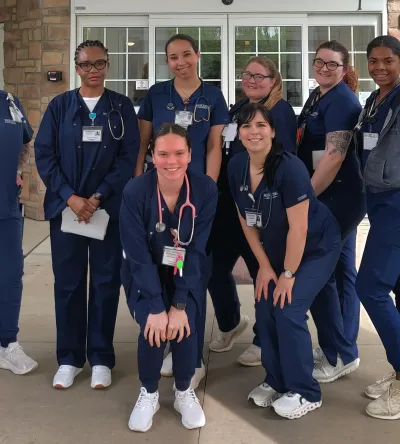
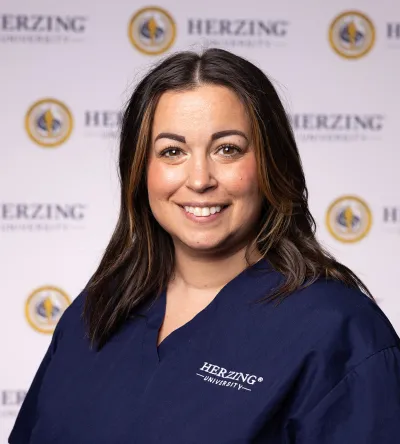
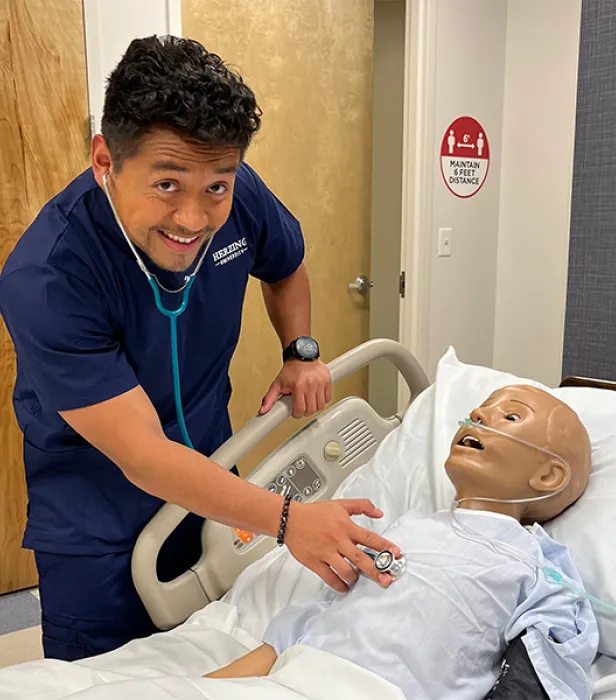
You can explore many different career opportunities as a BSN-prepared RN.
While earning a Master of Science in Nursing (MSN) can expand your duties to advanced practice across many specialties, you can also pursue different specialty roles with a BSN, including pediatrics, neonatal/NICU, oncology, neuroscience, Operating Room (OR)/surgical, and much more.
With enough experience you may consider advancing to roles in nursing education or nursing leadership. Keep in mind degree requirements may vary, including an MSN or Doctor of Nursing Practice (DNP).
We offer degree pathways to help you reach as high as you want to climb in the field of nursing.
Salary and job outlook
According to the Bureau of Labor Statistics, employment of registered nurses is expected to rise 6% from 2022-2032, and their average salary is $94,480 per year ($45.42 per hour).*
Now is a great time to begin earning the education you need to find a great job in healthcare, build a foundation for career growth and make an impact in your community.
Faq
Frequently Asked Questions
Didn't find the answer to your question? Send us an inquiry and we will be happy to answer all your questions!
There are a wide variety of different career paths in nursing, and depending on what makes the most sense for you there are several different types of nursing degrees you may consider:
- Diploma in Practical Nursing. The fastest way to start your nursing career is to earn a diploma in practical nursing and become a Licensed Practical Nurse. This isn’t a “degree” but it’s an alternative starting point if you’re ready to get your feet wet in nursing.
- Associate degree in nursing. Earn an associate’s degree in nursing and you’ll be eligible to sit for the NCLEX and become a Registered Nurse (RN).
- Bachelor’s in nursing. A bachelor’s degree is becoming the new educational standard for registered nurses, and it will qualify you for a master’s degree program.
- Master’s in nursing. Many roles up the ladder in nursing will require a master’s degree.
- Doctorate in nursing. Earn the terminal degree in nursing and reach the top of the field.
All schools have their own distinct degree programs based on their qualifications and areas of focus. Herzing University offers many different options to provide the shortest path to your destination no matter where you are right now, including campus bridge programs and online programs to help you reach the next level in your education. View all of our nursing programs.
It’s a question of:
- What your goals are
- How quickly you want to reach them
If your goal is to go from LPN to RN quickly, the best choice may be an associate’s degree program since you may be able to become an RN in less than 2 years.
If your goal is to become an RN and potentially advance further by working towards a master’s degree in nursing (MSN), your best option is a bachelor’s degree in nursing program.
Read about the most basic differences between ADN vs. BSN and discover what's best for you.
Our nursing programs are designed to be challenging, but not impossible. Your career as a registered nurse will be demanding, and our goal is to help you succeed and become the best healthcare provider you can be. We won’t do you any favors by making things too easy.
Learn more about how hard nursing school really is from Herzing graduates who have been through it. You will have support from Herzing University faculty, staff and other students every step of the way. Never be afraid to ask for help when you need it!
The advantages of a BSN can include:
- Increased autonomy in decision making while on the job
- Open doors to more specialties in the nursing field
- Become a more attractive candidate for hospitals seeking Magnet Recognition
- Build a foundation to grow into education or leadership pathways
- Positions you better for nursing jobs with higher pay
- Qualify to enroll in an MSN program
- Become more familiar and educated with evidence-based practice opportunities
- Increase knowledge and understanding of RN specialties and skills
- Transition from “technical” to “professional” RN
- Gain a deeper knowledge of nursing theory and leadership theory
A 2022 study from the American Association of Colleges of Nursing (AACN) indicates employers have the level of education at top of mind in the hiring process. Based on responses from nursing schools, the survey revealed 69.8% of employers show a strong preference for BSN graduates.
The ultimate benefit is bettering yourself, becoming the best nurse you can be and following the career path of your choosing.
Because nurses with a BSN have earned that next degree level and generally have the edge on the job market, they will on average earn a slightly higher salary than nurses with an ASN. However, there are always exceptions; an ASN with several years of an experience may earn a higher salary than an RN with a BSN who is just starting their career.
You don’t need a bachelor’s degree in nursing to become a registered nurse. Earn your associate’s degree in nursing and you can become an RN more quickly and earn your first set of scrubs.
However, if your goal is to continue climbing the ladder to become a nurse practitioner or pursue roles in nursing leadership or administration, you may be best off enrolling in a BSN program so you can reach your goals faster.
No matter what you choose, Herzing is here to empower you to become the best nursing professional you can be.
There are many different nursing specialties to choose from. Depending on your personality, educational background and preferred working environment you can follow your own personalized path in the nursing profession.
Here are a few popular nursing specialties you may consider:
- Aesthetic or Cosmetic nurse
- Assisted living nurse
- Cardiac/cardiovascular nurse
- Emergency room nurse
- Flight nurse
- Home health nurse
- Labor and Delivery nurse (L&D)
- Med/surgical nurse
- Neonatal/NICU nurse
- Nurse Anesthetist
- Oncology nurse
- Pediatric nurse
- Public health nurse
- School nurse
- Travel nurse
You can take our nursing personality quiz to get a better idea of what you might prefer in your nursing career.
Yes, general education and didactic/lecture nursing courses can be completed in our 3-year online BSN program for non-nurses.
The program does incorporate hands-on training, including clinicals and an intensive experience to ensure you are equipped to pass the NCLEX-RN, meet the board of nursing requirements in your state and become an RN-BSN.
With Herzing University you are never alone. It’s our goal to provide all students an affordable, career-driven education. Financial aid options include:
- Loan options – Federal & private
- Scholarships & grants
- VA / military benefits
- Other sources of financial aid
You can find an estimate for tuition and expenses by using the Herzing University tuition wizard.
We offer online associate, bachelor's, and master's degree pathways for those without nursing experience looking to become an RN. Eligibility varies by state of residence.
Learn more about our online nursing programs designed for non-nurses.
The Student Experience at Herzing
The program was difficult and fast, but the layout was perfect.
Merrick Gentile
Nursing Student | Kenosha CampusBeing exposed to a variety of patient populations and conditions helped me develop many nursing skills. It made me realize I wanted to work in an environment where I would continue seeing diversity in my day-to-day work.
Amie Jabang
Nursing Student | Madison CampusWhile I already had a current career, I was looking to make a change and start down a new path.
Kayci Krucas
Nursing Student | Kenosha CampusI was grateful for the experience, especially since I was able to complete my degree quickly.
Johanna Valdez
Nursing Student | Kenosha CampusNursing is definitely a hard career choice, but Herzing’s program helped me find confidence in myself.
Samantha Hudson
Nursing Student | Minneapolis CampusWhen the economy took a downturn, I decided to pursue a career in nursing. Herzing allowed me to get my degree in just 2 years!
Geoff Codlyn
Nursing Student | Madison CampusAccreditation & Disclosures
1. The baccalaureate degree program in nursing at Herzing University Atlanta is accredited by the Commission on Collegiate Nursing Education (http://www.ccneaccreditation.org).
Herzing University is accredited by the Higher Learning Commission (hlcommission.org), an institutional accreditation agency recognized by the U.S. Department of Education.
* Bureau of Labor Statistics (BLS), U.S. Department of Labor, Occupational Employment and Wage Statistics 2023 / Occupational Outlook Handbook 2022. BLS estimates do not represent entry-level wages and/or salaries. Multiple factors, including prior experience, age, geography market in which you want to work and degree field, will affect career outcomes and earnings. Herzing neither represents that its graduates will earn the average salaries calculated by BLS for a particular job nor guarantees that graduation from its program will result in a job, promotion, salary increase or other career growth.
Recent Blog Posts
Waived Enrollment Fee
Discover the educational pathway designed to maximize your career potential. Reach for greater heights with Herzing University.

